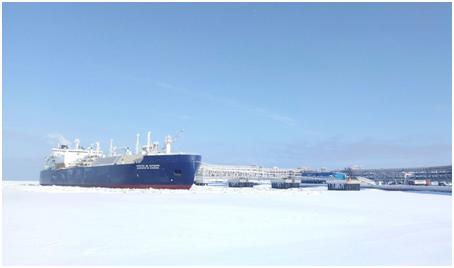
Russia’s fortress
economy has proved remarkably resilient to an onslaught of Western sanctions.
Two years after the Kremlin’s invasion of Ukraine, it continues to fund a
costly war and to prop up President Vladimir Putin.
But there’s at least
one spot where the pain is very real.
The Novatek
PJSC-led Arctic LNG
2 facility, on the
icy Kara Sea, is a key part of Moscow’s plans to boost exports and replenish
coffers. For months now, it has been ready to ship liquefied natural gas to new
markets, alternatives to the once-lucrative European pipeline trade. And yet, the vast new $25
billion operation is sitting virtually idle, the first piece of Russia’s
energy production complex to be effectively curbed by US restrictions.
“US sanctions are working surprisingly
well,” said Malte Humpert, founder of the Arctic
Institute, who has been monitoring Russia’s expansion in the region for over a
decade. “Here, they’re really ahead of the curve. They blocked Arctic LNG 2
before it even started production, blocked the vessels before they could be
delivered. With everything
else, like oil or the shadow fleet, it’s always reactive.”
The White House’s
National Security Council began turning its attention to crippling Russia’s LNG
expansion plans in 2023, about a year into the war, according to people with
knowledge of the strategy. Officials there teamed up with the US State
Department and Department of Defense to pick a target, eventually homing in on
the Arctic LNG 2 project. They then brought it to the Treasury.
Now, as part of a
wider plan to stop Russia from developing any new energy projects that might
contribute significant revenue, the US
wants to ensure the Arctic venture is “dead in the water,” as Geoffrey Pyatt, Assistant Secretary of State
for Energy Resources, told a conference last month.
While it certainly
irks important allies, freezing Arctic LNG 2 has the benefit of hurting Moscow
while causing only limited ripples in global natural gas markets. No less
important for the Biden administration as an election nears, the fallout for US
consumers is contained.
There are other
advantages for Washington. LNG trade requires expensive specialized ships that
can be tracked with satellite data, making the creation of an alternative fleet
nearly impossible. While there are
roughly 7,500 oil tankers today of varying sizes, the entire LNG industry is
closer to 700.
The biggest single
constraint on the development of Arctic LNG 2 is the availability of tankers. That’s the weak spot in the Russian
overall strategy,” said Thane Gustafson, a professor at Georgetown University
who has monitored Russia’s fossil fuel expansion for decades. The Kremlin
says it wants to export over 100 million tons of LNG per year by 2030, up from
about 31 million last year — with or without sanctions. Arctic LNG 2 is not the first project to be hit with restrictions, and
limits on technology transfer and hydrocarbon exploration equipment back in
2014 have spurred some local alternatives. Yet even the government is
beginning to recognize the scale of the challenge as sanctions accumulate and
technology proves slow to replicate. Figures in an Economy Ministry document
published earlier this year and seen by Bloomberg suggest that production could
in fact stagnate through 2027 under a conservative scenario, levels that would
imply Arctic LNG 2 may not rapidly ramp up.
None of the traders
and analysts surveyed by Bloomberg expected the facility — which has only
completed construction (and started) one of three production trains — would
reach full capacity while sanctions remain in place.
Novatek, the company
behind it all, is pressing on. Founder Leonid Mikhelson, Russia’s
fourth-richest person and a close Putin ally, succeeded in completing
construction of the first stage of the Arctic LNG 2 project last year…“The fact
that we have become a target of sanctions is a signal of how they assess our competencies,”
Mikhelson said at the XVI Verona Eurasian Economic Forum in November, shortly
after the project was sanctioned.
But now he needs to
contend with the potential departure of more foreign partners as constraints
tighten — and to find customers.
Novatek has hired
staff in China to try to drum-up business and sent officials to India in
February, according to people with knowledge of the matter. No concrete deals
have yet materialized, the people added. The next test will come in the summer,
when Novatek aims to ship its first LNG cargo from Arctic LNG 2, taking
advantage of ice thin enough to use a regular vessel, according to the people,
who requested anonymity as they are not authorized to speak to the media. “There
will be ad hoc voyages, but that’s really limited,” said Humpert, of the Arctic
Institute. “Where does Russia go from here?”